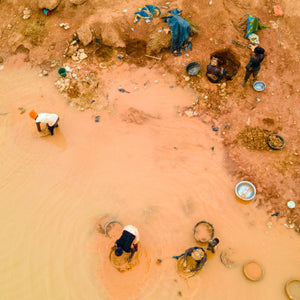The Devastating Effects of Water Pollution in Africa
Across Africa, water pollution is an ongoing issue that has a significant impact on the lives and livelihoods of many communities. In some regions, the pollution has reached alarming levels, leading to devastating consequences for both the environment and the people who depend on it. We explore the grave environmental, economic and social effects of water pollution in Africa, and some of the ways we can help minimize it.
Understanding water pollution in Africa

Water pollution is the contamination of water bodies, such as rivers, lakes and groundwater, by various harmful substances. These contaminants can take many forms, including chemicals, heavy metals, pathogens and other pollutants.
In Africa, water pollution arises from several sources, including agricultural runoff, industrial activities, domestic wastewater disposal and oil spills. You can learn more about the causes of water pollution in Africa here.
The effects of water pollution in Africa are varied and far-reaching. Let’s take a look at them in a little more depth.
Environmental consequences

Water pollution in Africa has dire environmental consequences that reverberate through ecosystems. It devastates aquatic habitats, leading to the destruction of sensitive ecosystems and contributing to the loss of biodiversity. Many species, some of which are unique to Africa, face the risk of extinction due to polluted waters, including fish, amphibians and birds.
Aquatic habitats are altered significantly, leading to the creation of dead zones where oxygen levels are too low to support life. This alteration of habitats further intensifies the decline in biodiversity, setting off a concerning chain reaction in the natural world.
Moreover, water pollution paradoxically exacerbates water scarcity. In the African region, water scarcity affects 1 in 3 people. As contaminated water sources become unusable, more and more communities are pushed to rely on dwindling clean water resources.
Health implications

The effects of water pollution in Africa ripple into the realm of public health, particularly impacting the most vulnerable populations. Contaminated water sources become breeding grounds for waterborne diseases like cholera, dysentery and typhoid. These diseases pose a significant threat to the health and well-being of African communities, with children being particularly susceptible. Shockingly, 115 people in sub-Saharan Africa die every hour from diseases linked to improper hygiene, poor sanitation and contaminated water.
Youngsters suffering from recurrent waterborne illnesses often experience malnutrition and stunted growth. These diseases also lead to alarmingly high mortality rates, especially among infants and young children.
The healthcare burden imposed by treating waterborne illnesses diverts resources away from addressing other pressing health concerns, exacerbating the overall public health crisis.
Economic impact
The economic ramifications of Africa’s water pollution are profound, impacting industries including agriculture, fisheries and tourism. Agriculture, a vital component of Africa's economy, is severely affected as polluted water sources hinder crop irrigation, leading to reduced agricultural productivity and food shortages.
Similarly, the fishing industry, which provides both protein and income for many communities, suffers as water pollution leads to declining fish populations. Africa's tourism potential, hinging on its stunning natural beauty, is also tarnished by water pollution, dissuading tourists and denting the tourism industry.
Social consequences

The effects of water pollution in Africa not only impact the environment and economy, but they also disrupt social fabric and community stability. The displacement of communities due to polluted water sources is a common outcome, as people are forced to relocate in search of clean water. This upheaval disrupts established ways of life, leading to social and cultural challenges.
Moreover, competition for scarce clean water resources can ignite conflicts within and between communities. Water scarcity exacerbates existing tensions, sometimes resulting in violence.
Education is also significantly disrupted, with some children having to spend long hours collecting water or be absent from school due to waterborne illnesses, hindering their educational opportunities and prospects.
How we can help

The devastating effects of water pollution in Africa are undeniable. This crisis threatens the environment, human health, economic stability and social cohesion across the continent. Addressing water pollution is not just a local concern; it is a global imperative.
Tackling Africa’s water pollution demands a multifaceted approach from governments, organizations and individuals. Effective waste management, including responsible disposal of industrial and household waste, is critical to reducing contamination of water bodies. Supporting sustainable agricultural practices and investment in cleaner technologies can also reduce their environmental footprint.
Ultimately, raising awareness about water conservation and advocating for stronger environmental responsibility fosters behavioral change. As individuals, we can contribute to grassroots initiatives (like local cleanups), increase public awareness and advocate for a more sustainable future for Africa.
These collective efforts can safeguard Africa's water resources, public health, and sustainable development.


